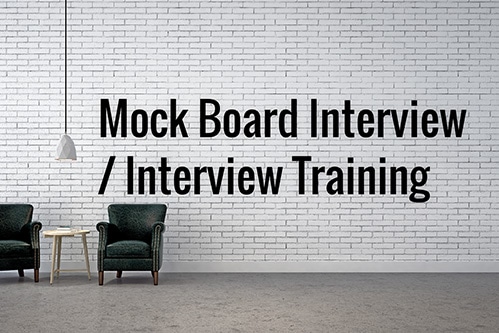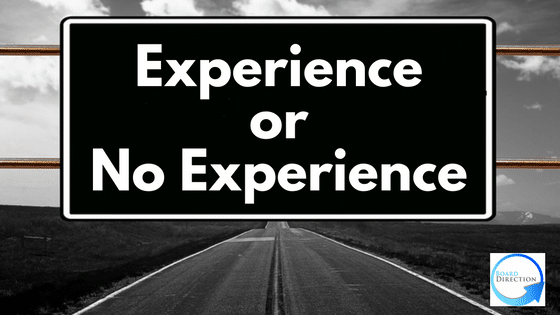If you have made it to the interview you should assume that you and they (the organisation) think you are qualified to do the role. But being qualified and experienced enough to do the role does not guarantee an appointment. In fact, over and over again I have sat in board interviews and seen how the most qualified candidates stumble during board interviews. This primarily occurs due to a lack of preparation. Specifically, they simply failed to show the organisation why they stand out from other equally qualified candidates and did not ‘dare them not to appoint them’.
Every board interview is different. Some are formal (with the whole board) and some are done in a coffee shop (with just the Chair or consultant). It does not matter what form your interview will take, your board interview preparation is of utmost importance.
Regardless of the type of interview, most consider it to be a situation where you are at the disposal of the interviewers. This is often the case but it needn’t be. If you are clear about what it is you can offer and know your Unique Selling Point, then you can begin to guide the interview towards the message you want to deliver.
It is important for you to do this carefully and appropriately. You should always answer the question posed to you directly. Nonetheless, you know why you should be appointed to the board, so it is important for you to not leave the interview without having clearly stated your value. Doing so will result in an interview that will reflect what you offer.
Board Interview Preparation in Practice
To do this successfully, you must know why they should appoint you. To help you do this, come prepared with three or four examples of success. You must provide evidence of successes that are relevant to their situation. Ideally, they will be aligned with the 5 elements that a Chair is likely to want to see in a successful candidate:
- Prior governance experience – having sat on or worked with boards
- Executive skills – considering what the board needs
- Networks – that the board can leverage for gain
- Demonstrable passion – for the organisation, industry, sector or governance
- Cultural fit – commonalities (people, places or interests)
If you do all this, you should find the interview fairly easy. That is not to say you will necessarily get the position; after all, you don’t know who else they are seeing. But you will have been able to best represent yourself and how you can help them achieve their goals.
There are a few things you need to do in preparation for your board interview
Understand who is interviewing you
This information is usually given to you by the recruiting organisation – though not always. It is essential, however, that you ask whom you will be seeing.
Most of the time it will be the Chair, but it could also include other board members – perhaps the CEO, a recruiter or an HR specialist.
Knowing whom you will be interviewed by, means that you can research them. You should consider not only their role on the board or in relation to the organisation, but also where else they might be a board member, what they have done before, what their interests are and, importantly, what commonalities you have – including who you might know in common.
Once you have this information it is far easier to demonstrate that you are an informed candidate and also to strike up a rapport. Here it is important to remember the fifth element of what Chairs look for – cultural fit. That is, that they want people they know and trust. Showing commonalties is a great way to do this and flatter them during the process – this never goes astray.
Research the role
In this case, researching the role means understanding what your contribution will be in response to what it is they desire from the new appointment. You must be able to clearly articulate this information based on your previous research of not only their organisation but also in speaking with stakeholders and competitors and through your on the ground research.
I focus on research a lot not only because this is the element that will make the interview plain sailing but also because it can be leveraged into new opportunities.
With this in mind, you should reach out to the initial connections that you used in your personal research. The purpose is to both update them on your progress and impress them by telling them that you are in the final throws of gaining an appointment. Hopefully, in doing this, you will be able to garner new information and also leave them with the impression that you offer value – a value that has now been confirmed in their minds because of your invitation to a board interview. You can further impress them by referencing the other research conversations you have had with their stakeholders.
Once you have finished your research, you need to familiarize yourself with the interview process itself. That means understanding:
- How long the interview will likely last
- Whether you are expected to give a presentation
- If there will be personality testing
- What sort of interview it will be – for example, will it be technical, informal or a panel of interviewers?
Forewarned is forearmed in this case, so getting as much information as you can up front is valuable – you will feel comfortable in the interview and know what to expect.
Understand how to respond to specific questions you will be asked
It might sound a little clichéd, but I recommend to all my members that they use the TEE approach when answering questions. Doing so means that you will keep your responses on track. If interviews make you nervous, I find working to a format makes things easier.
The TEE approach is simply breaking down the response to each question into 3 sections:
- Technical response
- Examples
- Evidence
Let’s use a question like: “Tell me about your non-executive experience.”
- The technical response would be to list your past or current NED experience. Simply stating this would make you a C candidate.
- The next element of your answer would be to give examples of what you did in these roles – perhaps you sat on subcommittees or were involved in a particular element of the business. Giving examples would make you a B candidates – along with many others.
- Finally, you should provide some evidence of success – what decisions you were part of, what the board or organisation was like when you first started on the board and what it is like now, or what particular strategic changes you brought about. This sort of response will make you an A candidates – a top 10% candidate.
Board interviews can be intimidating – even having done your research. However, using the advice and structure above should provide you some comfort.
I have conducted thousands of board interviews in my time and have coached hundreds to have successful candidates. Despite this I am constantly surprised (though shouldn’t be) the difference that conducting a mock board interview can make on the confidence and effectiveness of a interviewee. So, whether you do it with me or with someone else you trust preparing and practicing for a board interview is perhaps the most important thing to do prior to the actual interview itself.
Board Direction helps you find and gain board appointments. Click here to find out more

This service offers a full 2-hour mock board interview scenario with David Schwarz – Australia’s leading board recruitment expert and ex-board headhunter who has interviewed thousands of critical feedback. Guaranteed to give you the language confidence you need to ‘dare them not to appoint you’.
Click here to book your Board Interview Preparation Session
About the Author
David Schwarz is CEO & Founder of Board Direction – Australia’s leading board advertising and non-executive career support firm. He has over a decade of experience of putting people on boards as an international headhunter and a non-executive recruiter and has interviewed over one thousand non-executives and placed hundreds into some of the most significant public, private and NFP roles in the world. He has been described as Australia’s leading board recruitment expert, is a published author, a regular speaker on the board appointment process and runs Board Search Masterclasses across Australia. He is one of Australia’s Top 10 LinkedIn users with over 29,000 connections. Email: ua.mo1714038506c.noi1714038506tceri1714038506ddrao1714038506b@tca1714038506tnoC1714038506





